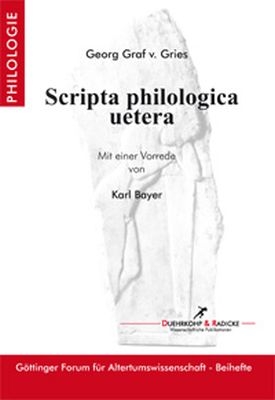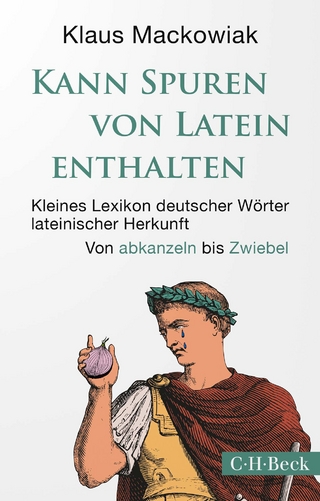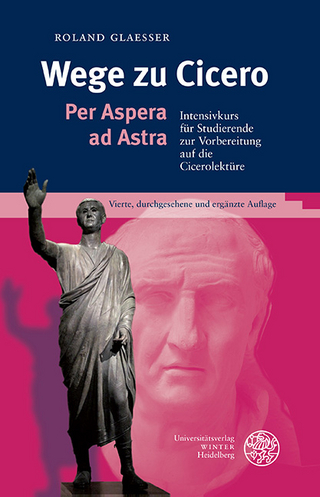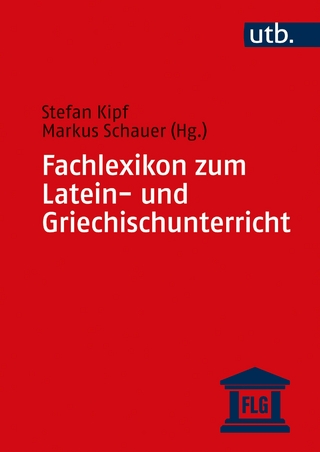
Scripta philologica uetera
Mit einer Vorrede von Karl Bayer
Seiten
2005
Duehrkohp & Radicke (Verlag)
978-3-89744-235-1 (ISBN)
Duehrkohp & Radicke (Verlag)
978-3-89744-235-1 (ISBN)
Es sind sowohl Fragen der Metrik im Altlatein und Klassischen Latein als auch Aspekte Neulateinischer Dichtung, denen sich der Autor in den 21 Aufsätzen und Rezensionen dieses Bandes widmet. Lateinische Choräle kommen ebenso in den Blick wie literarische, textspezifische und methodische Fragen zu Ennius, Nepos, Vergil, Quintilian, zu bukolischer Dichtung und Neulateinischer Literatur. In welcher Form verliehen antike und neulateinische Autoren ihren Gedanken Ausdruck? – in der Überzeugung, dass nur der Blick für die Einheit von Form und Inhalt zu einem vollständigen Verstehen führt.
The volume entitled Scripta philologica uetera, with a preface by Karl Bayer pleasing the author, brings together 21 papers and reviews written and now given their final form by Georg, Graf v. Gries. Metrical problems in Old and Classical Latin as well as in Neo-Latin poetry make up the largest part of the collection. Metrical theory and the clausulae of Latin prose are further subjects dealt with. Nevertheless, literary, textual, and methodic questions referring to Ennius, Nepos, Virgil, Quintilian, bucolic poetry, and Neo-Latin literature are also given due attention. The first item would at one time certainly have been accepted as the author’s doctoral thesis. The speech De Aenea uirtute is an attempt to edit ancient prose according to the colometry instead of modern punctuation. The two obituaries of H. D. Jocelyn allow a look at the life and scholarly achievement of one of the most learned philologists of the time and at the decline of learning and education within his lifetime. The last item surveys the possible influence of Plato’s Parmenides on Aristotle. The Graf v. Gries puts the utmost emphasis on the form in which ancient and Neo-Latin authors express their thoughts, in the belief that only regard for the unity of form and contents may lead to a full understanding. When the occasion arises he also pours scorn on the evils of the present time with some sharpness. This book will be of interest to classicists, Neo-Latin scholars, linguists, philologists of modern languages and musicologists interested in ancient metre and metrical theory; also to friends of spoken and written Latin in which, as in Greek, everything that elevates humanity can be adequately expressed.
The volume entitled Scripta philologica uetera, with a preface by Karl Bayer pleasing the author, brings together 21 papers and reviews written and now given their final form by Georg, Graf v. Gries. Metrical problems in Old and Classical Latin as well as in Neo-Latin poetry make up the largest part of the collection. Metrical theory and the clausulae of Latin prose are further subjects dealt with. Nevertheless, literary, textual, and methodic questions referring to Ennius, Nepos, Virgil, Quintilian, bucolic poetry, and Neo-Latin literature are also given due attention. The first item would at one time certainly have been accepted as the author’s doctoral thesis. The speech De Aenea uirtute is an attempt to edit ancient prose according to the colometry instead of modern punctuation. The two obituaries of H. D. Jocelyn allow a look at the life and scholarly achievement of one of the most learned philologists of the time and at the decline of learning and education within his lifetime. The last item surveys the possible influence of Plato’s Parmenides on Aristotle. The Graf v. Gries puts the utmost emphasis on the form in which ancient and Neo-Latin authors express their thoughts, in the belief that only regard for the unity of form and contents may lead to a full understanding. When the occasion arises he also pours scorn on the evils of the present time with some sharpness. This book will be of interest to classicists, Neo-Latin scholars, linguists, philologists of modern languages and musicologists interested in ancient metre and metrical theory; also to friends of spoken and written Latin in which, as in Greek, everything that elevates humanity can be adequately expressed.
| Erscheinungsdatum | 02.05.2016 |
|---|---|
| Reihe/Serie | Beihefte zum Göttinger Forum für Altertumswissenschaften ; 16 |
| Sprache | deutsch |
| Maße | 115 x 225 mm |
| Themenwelt | Literatur ► Klassiker / Moderne Klassiker |
| Geisteswissenschaften ► Sprach- / Literaturwissenschaft ► Latein / Altgriechisch | |
| Geisteswissenschaften ► Sprach- / Literaturwissenschaft ► Sprachwissenschaft | |
| Schlagworte | Antike, Klassische Literaturwissenschaft, Dichtung • Chor • Latein • Literatur • Literaturwissenschaft |
| ISBN-10 | 3-89744-235-3 / 3897442353 |
| ISBN-13 | 978-3-89744-235-1 / 9783897442351 |
| Zustand | Neuware |
| Haben Sie eine Frage zum Produkt? |
Mehr entdecken
aus dem Bereich
aus dem Bereich
kleines Lexikon deutscher Wörter lateinischer Herkunft
Buch | Softcover (2023)
C.H.Beck (Verlag)
15,00 €
Per Aspera ad Astra. Intensivkurs für Studierende zur Vorbereitung …
Buch | Softcover (2023)
Universitätsverlag Winter GmbH Heidelberg
23,00 €


